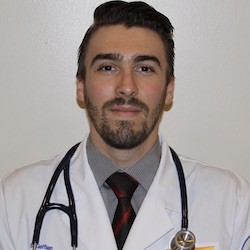A Day In The Life: Shawn Geffken

A Day in the Life
Shawn Geffken
D.O. (3rd Year)
Hello all, my name is Shawn Geffken. I'm currently in my third year at NYITCOM. I was born and raised in Huntington and I completed my undergraduate psychology major and chemistry minor at Stony Brook University.
The main reason why I chose NYITCOM was the school’s commitment to focusing on all aspects of patient care. Viewing each patient as an individual and formulating unique care plans are crucial to optimal outcomes. In many ways, the focus of medical care is shifting towards values that NYITCOM has long since viewed as quintessential.
It’s necessary to provide context before going into great detail about what a typical day is like for me at this time. Third year schedules will vary greatly depending on the specialty you’re on, and the location that you’re performing them at. I’m currently completing my OB/GYN rotation at Good Samaritan University Hospital and this is one of my more difficult rotations. My wake up time is 4 AM and I spend 45 minutes getting ready in the morning and usually try to incorporate some sort of workout. I’ll leave my house at 4:45 in order to get to the hospital, change and be ready to go at 5:30 AM. The majority of the day is spent scrubbing in and out of different surgical cases. There are a number of different procedures that you can see and assist in some of which include Caesarian sections, dilation and curettage, urogynecology procedures, hysterectomies, endometriosis/cancer resections. There is some downtime between cases, and this time is mostly used to prepare for the exam at the end of the month. Most third year rotations have a standardized national exam at the end to assess your competency in that field. At the end of the day sign out is performed where patient responsibility shifts from the morning shift to the afternoon shift around 5 PM. This takes around an hour and I’ll be able to leave the hospital at 6PM and get home around 6:45. At this time I generally try to find some sort of way to relax. This includes reading books, going to the gym, sitting in the sauna, or sometimes just kicking back on the couch and doing nothing.
The first two years of med school are important for knowing how to talk the talk in medicine. This is largely where you’ll learn how to communicate with other medical professionals. It will also teach you the basics of medical pathology and treatment plans. Overall, I felt as though we were provided with a good framework to build upon. However, it should be known that regardless of how well you prepare there will always be an adjustment when you begin clinical rotations. I personally found the mannequin simulation labs to be the most helpful. The sim lab was important for learning how to apply things hands-on when placed in a high pressure environment. It’s very easy to forget what you know the second that any sort of pressure is applied and I’m thankful that the first time I felt this pressure wasn’t in the hospital setting. The ICC (institute for clinical competence) practice patient cases, and DPR (doctor patient relationship) lab when used properly, were important times to hone your physical exam skills in a low pressure scenario.
In conclusion, I felt as though ICC and DPR lab were good tools in learning the basics of medical physical examinations. Additionally, they provided a framework for how to structure a soap note, present medical information in a potent matter, and how to take a history. The mannequin simulation lab was easily the best part of my first two years at school. The instructors, Tim and Chris are both phenomenal and have a tremendous amount of experience and wisdom. I want to end it by talking about how important it is to live in the moment. Medicine is a very stepwise field, college → medical school → residency → fellowship → attending. During this process it's very easy to fixate on getting to the next step while never truly appreciating the experiences along the way. Always be cognizant of that, and be sure to take some time to really appreciate the memories and friendships you make throughout your education.
View All >